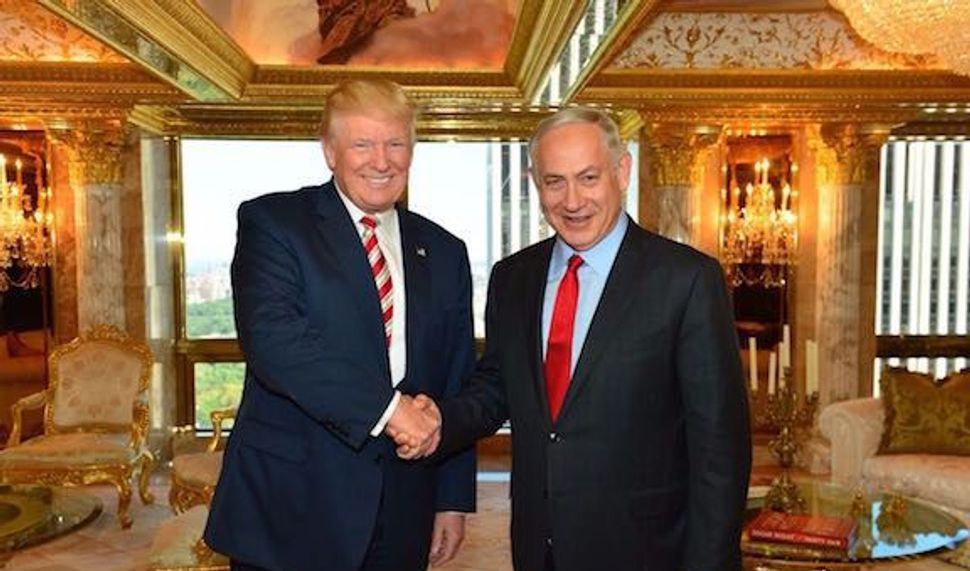Trump Seizes on Pre-Debate Netanyahu Meeting to Revise His Record

Donald Trump and Benjamin Netanyahu after their September 25 meeting in New York Image by Donald J. Trump Campaign
Israeli prime minister Benjamin Netanyahu may have wanted a low key-key rendezvous with Donald Trump September 25. The press, after all, was left standing outside the Trump Tower, but the Republican presidential candidate was aiming for as much attention as possible in his release of an unusually long and detailed press release.
Natanyahu was using the meeting, one of two the Israeli leader held with both presidential candidates hours before returning to Israel, to establish his bipartisan credentials and, if at all possible, to erase the damaging effect of his 2012 warm embrace of Republican candidate Mitt Romney, which came back to haunt him after Obama’s reelection. The candidates both sought to align their policies with that of Israel, but Trump went to greater lengths to do so, and into more detail.
Trump was the first to reach out to Netanyahu for a meeting (after an all-too-obvious prompt from senior officials close to the Israeli leaders stating Netanyahu would gladly meet with the candidates if they so request) and once the discussion concluded, he pointed out how his policy and that of Netanyahu are closely aligned.
First, the wall. “Mr. Trump and Prime Minister Netanyahu discussed at length Israel’s successful experience with a security fence that helped secure its borders,” Trump’s campaign statement read, stopping short of actually spelling out the parallels between Israel’s security barrier and the wall Trump intends to build along the Mexican border. But still the message was clear: Just as his friend Bibi built a wall, so can Trump.
Trump went on to draw another important parallel, stressing that Israel is “a vital partner of the United States in the global war against radical Islamic terrorism” and that its citizens “have suffered far too long on the front lines of Islamic terrorism.” For the Republican candidate, it was was yet another chance to highlight the fact that President Obama, and, to a certain extent Hillary Clinton, refuse to use the term “Islamic terrorism.”
The Republican candidate also promised to “finally accept the long-standing Congressional mandate to recognize Jerusalem as the undivided capital of the State of Israel,” hinting that if elected, he would adhere to congressional legislation and move the U.S. embassy in Israel to Jerusalem. This is a promise many candidates have made in the past, ever since the law was passed during the presidency of George H. W. Bush, but none have ever lived up to their promises. In fact, the pledge is likely to make little difference to Israeli policymakers, who have already learned to accept the fact that regardless who occupies the Oval Office, there will always be a presidential waiver signed delaying the embassy relocation to Jerusalem.
But for Trump, who had entered the discussion over the Jerusalem at a relative disadvantage, after refusing early on in the race to commit to the idea that the city will remain undivided if and when a peace accord is achieved, the meeting as a chance to set the record straight.
In his meeting with Netanyahu, Trump came full circle on many of the issues that had concerned pro-Israel Republicans. By now, he had corrected his message on Jerusalem, clarified his ambiguous stance on U.S. foreign aid to Israel and backtracked his promise to show “neutrality” when negotiating an Israeli – Palestinian peace deal. For most Jewish Republican voters and donors this, polls suggest, will probably make little difference, mainly because of Trump’s racially tinged comments and the anti-Semitic rehtoric coming from some of his backers.
But for at least one donor, who had made Israel a key issue in his pledge to support Trump, the meeting could help loosen his purse straps. Sheldon Adelson, the GOP’s most generous Jewish supporter, is now, according to the Guardian increasing his contribution to a pro-Trump super PAC to $25 million, after initially snubbing Trump with a smaller $5 million donation.
Clinton, who met with Netanyahu at the Union Square W Hotel, was less eager than Trump to meet the Israeli visitor on the eve of the first presidential debate. With deep ties in the pro-Israel community and a long policy record on Middle East policy issues, the Democratic candidate had little to gain from the 50 minutes sit down, but when the prime minister’s office called to say Trump was interested, Clinton joined in.

Israeli prime minister Benjamin Netanyahu and Democratic presidential candidate Hillary Clinton meeting in New York September 25
While touching on all the required issues, including commitment to Israel’s security and support for foreign aid, Clinton too used the meeting as a political opportunity. The Democratic candidate made a point, according to a readout from her campaign, of stressing “her opposition to any attempt by outside parties to impose a solution, including by the UN Security Council.” In this statement, Clinton effectively distanced herself from the Obama administration, who has refused to rule out a UN move in the final months of his administration. Such a move could have exposed Clinton to criticism in pro-Israel circles, criticism that she has now managed to preempt.
Contact Nathan Guttman at [email protected] or on Twitter @nathanguttman
A message from our Publisher & CEO Rachel Fishman Feddersen

I hope you appreciated this article. Before you go, I’d like to ask you to please support the Forward’s award-winning, nonprofit journalism so that we can be prepared for whatever news 2025 brings.
At a time when other newsrooms are closing or cutting back, the Forward has removed its paywall and invested additional resources to report on the ground from Israel and around the U.S. on the impact of the war, rising antisemitism and polarized discourse.
Readers like you make it all possible. Support our work by becoming a Forward Member and connect with our journalism and your community.
— Rachel Fishman Feddersen, Publisher and CEO





















